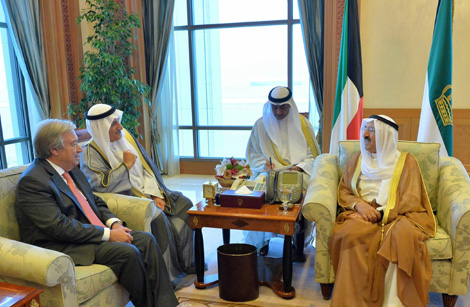
KUWAIT HH the Amir Sheikh Sabah Al-Ahmad Al-Jaber Al-Sabah meets UN Secretary General Antonio Guterres yesterday. - KUNA
KUWAIT: Visiting UN Secretary General Antonio Guterres yesterday appreciated HH the Amir Sheikh Sabah Al-Ahmad Al-Jaber Al-Sabah's leading humanitarian role and efforts to contain the Gulf crisis. Speaking during a meeting with the Amir, Guterres said it was an enormous honor and pleasure to be in Kuwait again and "very clearly pay tribute not only to what has been the humanitarian leadership I've witnessed in my position and that led my predecessor to appoint you as the Humanitarian Leader, but today it's much more than that".
Guterres also highly commended the crucial role and efforts by Kuwait in all political and humanitarian issues. "I consider Kuwait to be the voice of equilibrium, with dialogue and wisdom in the region. When I see the entire crisis, from Syria to Yemen to the new Gulf crisis, not to mention all the other places of crisis, your leadership has been the leadership of tolerance, dialogue and the bringing of people together," said Guterres.
He said Kuwait has "no agenda but peace, understanding and security, and this was what led me during the beginning of the crisis in the Gulf to say that the United Nations policy is very simple - it is to support Kuwaiti mediation". "We recognize the leadership of Kuwait and we support Kuwait," the UN chief added.
Meanwhile, Guterres urged warring parties in Yemen to allow humanitarian aid into the country amid a political stalemate that has seen violence spill into Sanaa. "We are doing are best to create the conditions for the present stalemate to be overcome," Guterres said after talks in Kuwait. His comments come after tension between Yemeni ex-president Ali Abdullah Saleh and his ally Abdul Malik Al-Houthi, who control the capital Sanaa, escalated into armed clashes that left two rebels and a pro-Saleh colonel dead late Saturday.
Since 2014, the Saleh-Houthi alliance has fought the UN-recognized government of Abedrabbo Mansour Hadi for control of the impoverished country. Witnesses in the capital said the ex-president's forces had spread in southern parts of the city near the presidential offices, which Saleh still holds despite resigning in 2012. A Saudi-led coalition supporting the Hadi government imposed an air and sea blockade on all rebel-held territory in March 2015 and tightened it in August last year saying it was the only way to stop weapons smuggling.
Guterres said the UN was trying to facilitate the re-opening of the country's main international airport in Sanaa as well as the Hodeida port, a key entry point for aid also in rebel-held territory. "We will be working very closely with the (parties) to see when and how a new strong initiative will be possible," he told a news conference. Guterres said both places needed to be operate fully, saying Yemeni people were "suffering in such a terrible way".
More than 8,400 civilians have been killed and 47,800 wounded since the Arab coalition joined the war in 2015, according to the World Health Organization. Another 2,000 people have died of cholera in a deadly outbreak that has spread across Yemen since April. Long the poorest country in the Arab world, millions of Yemenis now stand at the brink of famine, according to the United Nations.
Guterres also said the UN faces "no pressure" from the Saudi-led coalition over a draft UN report on child deaths in Yemen, amid rising concern over civilian casualties from the alliance's air raids. "We are not facing any pressure and we consider that no pressure would lead to anything, but we are not having any pressure," he said. "There is a technical work being conducted, and in the end, that will be presented to me and I will take the decision according to what I will feel is the right thing to do." - Agencies










